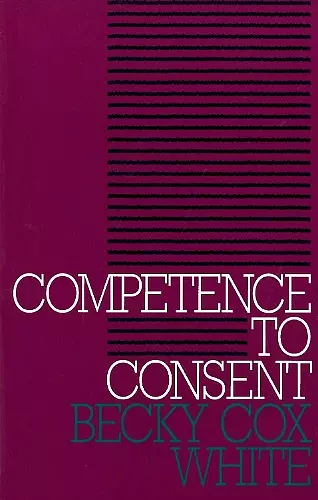Competence to Consent
Format:Paperback
Publisher:Georgetown University Press
Published:16th Sep '94
Currently unavailable, our supplier has not provided us a restock date

This is a serious and important theoretical contribution to the discussion of competence and consent developing in bioethics and political theory. Its strengths are its rigor and clarity of argument; its economy and elegance of language; and its willingness to move from theoretical to practical implications. White's clinical experience strengthens her phenomenological analysis and incorporates the insights of philosophy, anthropology, modern psychology, medical sociology, and nursing...it provides the basis for establishing practical and efficacious tests for competence. -- Joel Zimbelman, chair, Department of Religious Studies, California State University, Chico
Free and informed consent is one of the most widespread and morally important practices of modern health care; competence to consent is its cornerstone. This book provides an introduction to the key practical, philosophical, and moral issues involved in competence to consent.Free and informed consent is one of the most widespread and morally important practices of modern health care; competence to consent is its cornerstone. In this book, Becky Cox White provides a concise introduction to the key practical, philosophical, and moral issues involved in competence to consent. The goals of informed consent, respect for patient autonomy and provision of beneficent care, cannot be met without a competent patient. Thus determining a patient's competence is the critical first step to informed consent. Determining competence depends on defining it, yet surprisingly, no widely accepted definition of competence exists. White identifies nine capacities that patients must exhibit to be competent. She approaches the problem from the task-oriented nature of decision making and focuses on the problems of defining competence within clinical practice. Her proposed definition is based on understanding competence as occurring in a special rather than a general context; as occurring in degrees rather than at a precise threshold; as independent of consequential appeals; and, as incorporating affective as well as cognitive capacities. Combining both an ethical overview and practical guidelines, this book will be of value to health care professionals, bioethicists, and lawyers.
ISBN: 9780878405602
Dimensions: unknown
Weight: 367g
224 pages